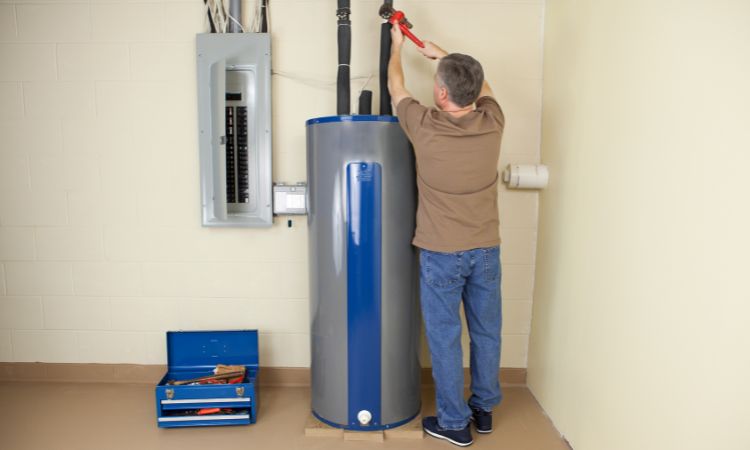Everyday Water Heater Problems
Everyday Water Heater Problems
Blog Article
We've encountered this article relating to Water Heater Repair and Troubleshooting listed below on the internet and believe it made sense to relate it with you on this site.

Imagine beginning your day without your regular hot shower. That currently establishes a poor tone for the remainder of your day.
Every home requires a reputable hot water heater, yet just a couple of know how to handle one. One very easy means to maintain your water heater in top shape is to check for faults on a regular basis as well as fix them as quickly as they appear.
Remember to switch off your water heater prior to sniffing about for faults. These are the hot water heater faults you are more than likely to run into.
Water as well warm or too chilly
Every water heater has a thermostat that determines exactly how hot the water obtains. If the water entering into your residence is also hot regardless of setting a hassle-free maximum temperature level, your thermostat might be defective.
On the other hand, as well cold water may be due to a failed thermostat, a broken circuit, or inappropriate gas circulation. For example, if you use a gas hot water heater with a damaged pilot burner, you would certainly get cold water, even if the thermostat remains in ideal condition. For electrical heating units, a blown fuse may be the wrongdoer.
Inadequate hot water
Hot water heater come in lots of sizes, depending upon your warm water demands. If you run out of hot water before everybody has had a bath, your hot water heater is as well tiny for your family size. You should take into consideration setting up a larger hot water heater tank or opting for a tankless hot water heater, which occupies less area and is a lot more long lasting.
Strange sounds
There go to the very least 5 kinds of noises you can learn through a water heater, however one of the most usual interpretation is that it's time for the water heater to retire.
First off, you should be familiar with the typical seems a water heater makes. An electrical heating system might seem different from a gas-powered one.
Standing out or banging audios typically indicate there is a piece of debris in your storage tanks, and also it's time to clean it out. On the other hand, whistling or hissing sounds may merely be your valves allowing some stress off.
Water leaks
Leakages might originate from pipelines, water links, shutoffs, or in the worst-case situation, the storage tank itself. Gradually, water will certainly wear away the container, and also locate its escape. If this occurs, you need to change your water heater asap.
Nevertheless, prior to your change your entire container, be sure that all pipes remain in place and that each valve functions flawlessly. If you still require aid recognizing a leakage, call your plumber.
Rust-colored water
Rust-colored water means among your water heater parts is corroded. It could be the anode pole, or the container itself. Your plumber will certainly have the ability to determine which it is.
Lukewarm water
Despite just how high you established the thermostat, you won't get any hot water out of a heating system well past its prime. A water heater's efficiency may decrease with time.
You will also get warm water if your pipelines have a cross link. This means that when you activate a faucet, warm water from the heating system moves in along with normal, cold water. A cross link is simple to area. If your hot water taps still pursue closing the hot water heater valves, you have a cross link.
Discoloured Water
Rust is a major cause of unclean or discoloured water. Corrosion within the water container or a stopping working anode pole could create this discolouration. The anode rod protects the tank from rusting on the within and also need to be inspected annual. Without a rod or a properly operating anode rod, the hot water swiftly corrodes inside the tank. Contact an expert hot water heater specialist to establish if replacing the anode pole will fix the trouble; if not, change your water heater.
Verdict
Ideally, your water heater can last 10 years before you require a change. However, after the 10-year mark, you may experience any one of these faults extra on a regular basis. Now, you should add a new water heater to your budget plan.
How To Troubleshoot 3 Common Water Heater Problems in Twin Cities
The Water Heater Is Leaking
A leaky cold water inlet valve A loose pipe fitting A leaky temperature and pressure relief valve A corroded anode rod A cracked tank Turn Off Your Water Heater:
Shut off your gas water heater by turning the gas valve on the unit to the “OFF” position. Shut off your electric water by switching its power off at your electrical panel. Look for a two-pole breaker labeled “water heater” and turn it to the “OFF” position. Move the ball valve connected to the water heater to be perpendicular to the piping at a 90° angle. Look for the Leak:
Depending on whether the water is coming from the tank's top or bottom, you’ll want to look for the leak in different locations.
If the leak comes from the top of the tank, carefully look for water escaping from the cold water inlet valve or loose pipe fittings. Rusted hot and cold water valves can have loose connections with the tank, with water leaking out of them.
https://mspplumbingheatingair.com/blog/how-to-troubleshoot-3-common-water-heater-problems
I'm very fascinated with Common Problems with Your Home Water Heater and I hope you enjoyed reading the entire entry. Liked our review? Please share it. Let somebody else discover it. I treasure reading our article about Common Problems with Your Home Water Heater.
Start Now Report this page